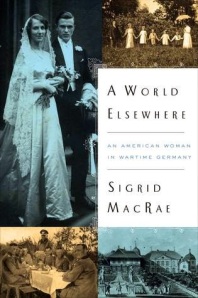By Sigrid MacRae. Viking, 310 pages, $27.95
Reviewed by Jules Wagman
The box held her father’s letters. As Sigrid MacRae read them, “The voice of my mother’s young lover, so long silent, emerged from his letters like a genie out of a bottle.”
Her mother, Aimee, was a Mayflower descendant and Hartford heiress, Heinrich a poor baron. She was on a lark in Europe; he wanted to become a diplomat. They were 24 years old and it was the Roaring 20s.
To Heinrich’s letters from a year’s courtship, author MacRae added family lore and library research to create this elegy. Four letters from her mother were found through a near-miracle.
Her parents’ love and comparatively short life together heightens the unspoken love of a daughter for her mother and the father she couldn’t know.
Aimee Ellis’s own mother died when she was three, her father at 23. A grand tour after schooling convinced Aimee that Europe was her future. She returned in 1927 with a schoolmate who knew Heinrich from a party and planned a Paris rendezvous.
They did meet again, but when her friend left, Aimee stayed. Heinrich shared bicycle rides with her, “opening dimensions…in almost everything they saw… She was suddenly, overwhelmingly in love.”
Heinrich of the “unpronounceable last name, von Hoyningen-Huene,” was virtually penniless. The Russian revolution expelled aristocratic Baltic Germans who were tsarist functionaries. Vivid word pictures described his family and “St. Petersburg’s long dark winters, where night came early and dawn dragged its feet.”
Their courtship blossomed. There was “that fragrant May meadow…The flowers and grasses bending over them, the stars turning in the night sky, had conspired with her own desire.”
They married on her 25th birthday, in October 1928; she was pregnant. Her new family teemed with relatives recounting stories of St. Petersburg and their ancestral home in today’s Latvia.
Reality brought the worldwide depression. Heinrich took up translating, Adolf Hitler came to power, the children kept coming and Aimee’s mother’s trust fund fed them.
Heinrich joined the Nazi party but was ejected within a year for opposing party policies. They bought a farm and struggled through the 1930s when he failed to become a diplomat. Ms. MacRae reveals the life of ordinary Germans under Hitler.
A reserve army officer, Heinrich served in France then the Eastern Front where he was killed in July 1941. Aimee was pregnant with their sixth child, Sigrid.
When Germany declared war on America, Aimee learned that U.S. law considered her four older children enemy aliens; the two younger ones, under a 1934 law, were Americans. Refusing to split her family, she remained in Germany.
Far from air raids and politics, the farm was her anchor. As the war ended they fled west. The oldest boy escaped military camp during Germany’s collapse.
In 1947 she learned she must return to America within six months or lose her citizenship; only her two youngest could accompany her. They emigrated and she began battling to reunite the family in America.
Bowdoin College in Maine helped out. The dean said, “If you can find a place to live and the boys are up to it scholastically, I guess we can help.” Maine’s congressman sponsored two bills to admit the four older children. They were together again.
In 1966 a former Dutch prisoner of war sent Aimee letters she wrote in 1927. Trudging home in 1945, the ex-POW had found them in an abandoned tunic where Heinrich was killed.
Though there are gaps, MacRae relates a beautiful tale of love, loss and fortitude.
Jules Wagman has been reviewing books since 1966.
©2014 by Jules L. Wagman
